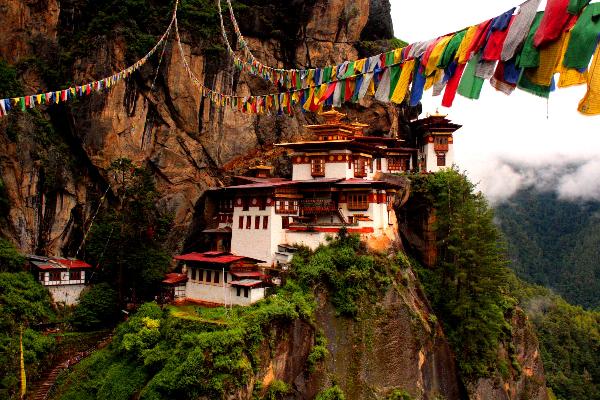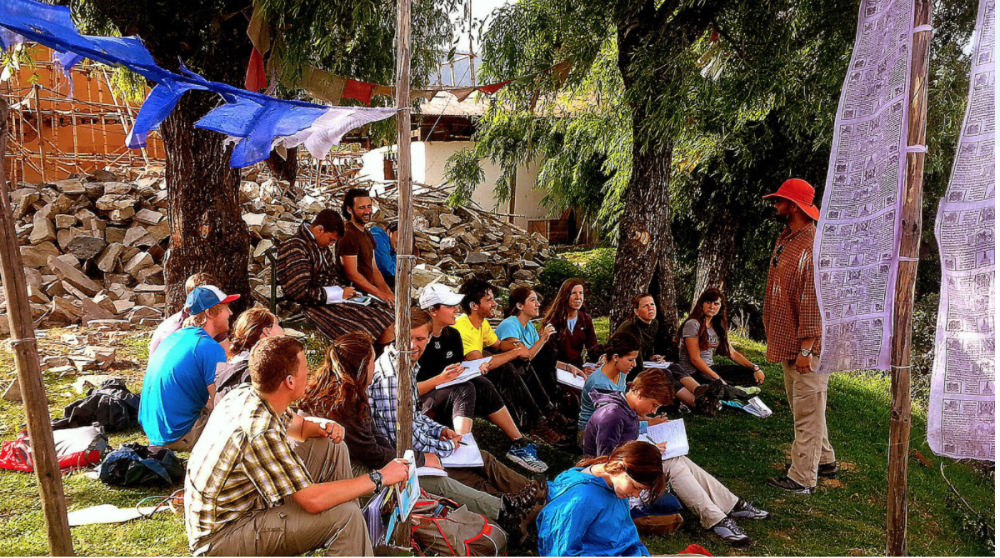
SFS BHUTAN: HIMALAYAN ENVIRONMENT AND SOCIETY IN TRANSITION (SEMESTER)

PROGRAM DETAILS
- Terms: Fall, Spring
- Credits: 18 semester-hour credits
- Prerequisites: One semester of college-level ecology, biology, or environmental studies/science; 18 years of age
- Application Deadline: Rolling admissions. Early applications encouraged
- Financial Aid: All accepted students can apply for need-based scholarships, grants, and loans
OVERVIEW
Explore a corner of the Himalayas where few foreigners ever step foot. Experience Bhutan’s unique culture and diverse ecosystems as you trek through remote villages and high mountain passes. Learn how Buddhist philosophy influences the country’s environmental policies and how the people of Bhutan are addressing the challenge of maintaining biodiversity and traditional rural lifestyles in a time of transition. Gain practical skills in field research and data collection and apply them to an extensive research project.
PROGRAM HIGHLIGHTS:
- Embark on a multi-day cultural trek to experience the natural beauty of Bhutan’s countryside and the traditional lifestyles of its people.
- Visit monasteries and take part in unforgettable tshechus (festivals) to learn more about Buddhism and Bhutanese culture.
- Explore Bhutan’s diverse range of biomes through trips to Himalayan ridges, the subtropical Punakha and Chukha Valleys, and the alpine meadows of Phobjikha.
SFS students live and study at the Center for Himalayan Environment and Development Studies. The Center is located at one end of the stunning Paro Valley, at the base of a towering ridgeline dotted with Buddhist monasteries. Campus is a small cluster of buildings designed in the traditional Bhutanese architectural style. A pleasant 15-minute walk brings you to the markets, shops, and cultural events of Paro Town.
RESEARCH THEMES
- Mountain ecology and conservation
- Climate change
- Gross National Happiness
- Forest management
- River ecosystems
- Agriculture and urban migration
CORE SKILLS
- GIS and mapping
- Species identification
- Camera trapping and mist-netting
- Biodiversity surveys
- Research design and implementation
- Data collection and analysis
- Research presentation
CONNECT WITH SFS
Visit the
SFS website
Call the Admissions Hotline at 800.989.4418
Email
admissions@fieldstudies.org
Read updates from the field on the
SFS Blog
Follow SFS on
Instagram and
Facebook
Watch student videos on
YouTube and
Vimeo
SFS: Himalayan Studies

In Bhutan—a Himalayan country with towering mountains, lush forests, and a distinct cultural heritage—progress is measured not just by economic growth, but also through good governance, cultural preservation, and environmental conservation. Sustainable management of natural resources—including soil, water, biodiversity, and minerals—is critical for Bhutan, as these resources are fundamental to the national identity, as well as the local and national economies. Through their research, students contribute to the advancement of SFS’ joint research agenda with the Ugyen Wangchuck Institute for Conservation and Environmental Research (UWICER) and the Bhutan Ecological Society (BES) in areas including biodiversity and conservation, sustainable forestry, resource management, and development.
Trekking across valleys and ridges and through villages, students learn about the culture, Buddhist philosophy, and environmental issues, and gain an intimate knowledge of the local ecosystems and rural livelihoods. Students develop skills in assessing environmental problems, defining research questions, conducting field research, and communicating results.
Back To Top
Paro
Western Bhutan
Back To Top
Course Availability
Courses are available in the following subjects:
- SFS 2010 Religion and Culture of Bhutan (2 credits)
- SFS 3040 Political and Socioeconomic Dimensions of Environment (4 credits)
- SFS 3050 Land Use, Natural Resources, and Conservation (4 credits)
- SFS 3060 Mountain Ecology (4 credits)
- SFS 4910 Directed Research - Bhutan (4 credits)
Back To Top
SFS students live and study at the Center for Himalayan Environmental and Development Studies, located in the town of Paro in Western Bhutan.
Back To Top
